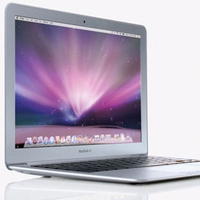Will the MacBook Air ruin the MacBook Pro?


At the same time, the solid results from the ultralight spark questions about the redesign of the MacBook Pro — whenever Cupertino decides to refresh the top-of-the-line machine. What will be the balance of performance and mobility in the new professional machine?
Longtime Mac developer and pen-computing pioneer David Dunham this week posted several posts on his blog about his MacBook Air experience. He's the programmer/owner of A Sharp.
He noted in a blog post of first impressions that he was dreading checking its speed. He said that Xbench 1.3 benchmarking software reported that his MacBook Pro came in with a 96.3 rating and the MacBook Air only a 54.2 mark — half the speed. He worried that the ultralight's slower, 4,200rpm 1.8-inch iPod-style HDD might be a problem (his MacBook Pro has a 2.5-inch 7200 rpm disk).
It certainly doesn’t seem like it. Large disk copies may indeed be slower (I haven’t done tests). That might be because it’s using USB-2 instead of FireWire. In any case, large copies aren’t that common (once the machine is set up). A more reasonable test is something I do every day: compiling Mac applications. I tried compiling Opal (a moderate-sized Objective-C application, with two plug-ins) on both machines.
MacBook Pro 46.0 s MacBook Air 48.4 s
That’s barely a speed penalty! I’ll have to try with some larger code bases, but this is in line with what I was hoping for (there’s a larger cache and faster bus on the MacBook Air, which may counteract the slower clock and use of some RAM for graphics).
(Note: Dunham is the author of Acta, the popular and elegant outlining application for the Classic Mac OS. He revamped it for Intel Macs and renamed it Opal. It costs $32. If you want an easy-to-use but powerful outliner, give the Opal demo a try.)
A later test in building a larger Xcode project came with a slightly greater speed hit.
MacBook Pro: 2:05.4 MacBook Air: 2:53.1
This is probably a good comparison (and likely one where a faster disk would make a difference). The MBP takes about 72 percent as long, or the MBA takes 38 percent longer. I suspect I can live with this — it’s not like I rebuild all files daily.
It's obvious from his posts that the MacBook Air will be Dunham's primary machine and not a secondary machine. This goes contrary to be a common thesis around the ultralight Macintosh: that it has to a secondary machine, perhaps for celebrity Mac users. Just as the wealthy have a vacation home, they use an ultralight for carrying their computing on the road.
In a post written at the Macworld Expo shortly following the MBA's release, Why does the MacBook Air make so many so dumb?, I considered that the ultralight would be a primary machine for certain users, primarily persons who appreciated style and mobility and who could afford. it. But perhaps it has a wider appeal.
Now, David Dunham is a smart guy. He's a programmer and a game player. Yet he's willing to make the MacBook Air his primary machine. Of course, he can afford it (he can write off the purchase, after all). Still, when Apple offered a machine with mobility at the front of its design, this factor gained in importance over performance, capacity and expandability.
Here's another question to ponder: What does the MacBook Air do the rest of the lineup?
According to my colleague Jason O'Grady and other sources, a refresh of the MacBook Pro is coming soon. Will the update be a "simple" processor swap or will Apple give the new MacBook Pro a total makeover?
As I've mentioned before, Mac users have traditionally voted for performance. With the MacBook Air available to customers who value mobility, perhaps the MacBook Pro can become heavier and more powerful.
Yet Apple may believe that customers want the MacBook Pro lighter, leaning towards mobility rather than performance. As much as my shoulders ache when shlepping the heavy MacBook Pro, I still vote for more power even if it means weight.
Check out: Could the MacBook Air's trackpad support pen input?